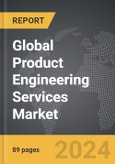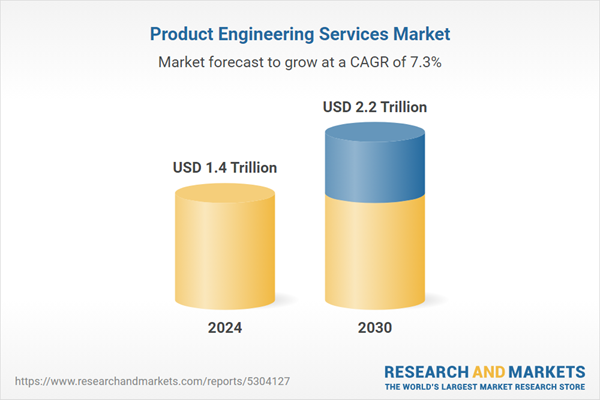Global Product Engineering Services Market - Key Trends & Drivers Summarized
What Are Product Engineering Services, and How Do They Support Innovation?
Product engineering services (PES) encompass the end-to-end process of designing, developing, testing, and deploying products across a variety of industries. Unlike traditional product design, product engineering is a more technical, comprehensive approach that combines engineering expertise with product lifecycle management to create functional, reliable, and market-ready products. These services often involve a multidisciplinary team, including mechanical, electrical, and software engineers, who collaborate to address both the aesthetic and technical aspects of a product. With a focus on functionality, cost efficiency, and scalability, product engineering services play a critical role in helping companies introduce innovative products to the market faster and more efficiently. Sectors such as automotive, aerospace, electronics, and industrial manufacturing rely heavily on PES to meet high standards of reliability, regulatory compliance, and performance.By outsourcing to specialized engineering firms, companies gain access to cutting-edge technology and industry-specific expertise, optimizing product quality and reducing the risk of costly design flaws. Product engineering services are increasingly adopting agile and iterative processes that allow for quick feedback and continuous improvement, making it possible to rapidly adapt to shifting market needs and technological advancements. Additionally, PES providers integrate customer feedback into development, ensuring the final product aligns closely with end-user expectations. This user-centered, adaptable approach not only enhances innovation but also shortens the time-to-market, positioning companies to stay ahead in highly competitive markets.
How Is Technology Advancing Product Engineering Services?
Technology advancements, including AI, IoT, digital twins, and cloud computing, are significantly enhancing the capabilities of product engineering services. Artificial intelligence and machine learning are increasingly used to analyze performance data, optimize design, and predict potential product issues before they arise, allowing engineering teams to make informed adjustments early in the development process. For instance, AI-driven generative design enables engineers to explore thousands of design permutations to identify the most efficient and cost-effective options. In sectors like automotive and aerospace, where precision and safety are critical, these technologies help to improve quality and reliability while reducing costs associated with prototyping and testing.The Internet of Things (IoT) and digital twins are also transformative in PES, providing real-time data from connected products and creating virtual replicas that simulate real-world usage. Digital twins allow companies to test how products will perform under various conditions, identifying potential improvements and reducing physical testing requirements. With IoT-enabled products, engineering teams can continuously collect data from the field, supporting predictive maintenance, feature updates, and post-launch optimizations. Cloud computing further enhances PES by facilitating collaboration and data sharing across global engineering teams, making it easier to access information, scale resources, and coordinate projects in real-time. These technological advancements are integral to the growth of product engineering services, allowing companies to create smarter, more resilient products that align with the evolving demands of consumers and industrial applications.
Why Are Companies Adopting Product Engineering Services?
Companies are increasingly adopting product engineering services to streamline the development process, improve product quality, and reduce costs. In industries where product lifecycles are short and innovation cycles are rapid, PES providers offer a competitive advantage by allowing companies to leverage specialized skills and resources without investing in extensive in-house engineering teams. By partnering with PES providers, companies gain flexibility and scalability, as these services can be tailored to specific stages of the product lifecycle, from conceptualization to manufacturing and post-launch support. This enables businesses to focus on core activities, such as market strategy and customer engagement, while relying on experts to manage technical design and engineering.The adoption of product engineering services is also driven by the growing emphasis on user experience and customer-centric design. As companies strive to deliver products that meet specific user needs, PES providers bring a user-centered approach, conducting thorough market research and user testing to inform product development. This ensures that products are not only functional but also intuitive, engaging, and aligned with user expectations. Additionally, with increased regulatory standards and environmental considerations, companies are turning to PES providers for assistance in meeting compliance requirements and developing eco-friendly solutions. By leveraging PES for regulatory compliance, sustainability, and technical excellence, companies can improve their reputation, reduce risk, and enhance customer satisfaction.
What Factors Drive Growth in the Product Engineering Services Market?
The growth of the product engineering services market is driven by the demand for faster time-to-market, the rise of digital transformation, and increased focus on sustainability. As global competition intensifies, companies are under pressure to launch new products quickly to maintain market relevance, and PES providers help expedite the development cycle by offering expertise in rapid prototyping, testing, and agile engineering. Digital transformation initiatives across industries have also fueled demand for PES, as companies seek to modernize legacy products, integrate smart technologies, and leverage data analytics for continuous product improvements. The emergence of connected devices and smart products in sectors like healthcare, automotive, and consumer electronics has created a surge in demand for PES, as companies require specialized knowledge in areas such as IoT, embedded systems, and AI to create intelligent, data-driven products.Additionally, environmental sustainability has become a critical growth driver for product engineering services. Companies are increasingly tasked with creating products that adhere to sustainable design principles, reduce waste, and minimize environmental impact. PES providers are helping companies achieve these goals by designing energy-efficient products, developing recyclable materials, and adopting lifecycle management practices that promote circular economy principles. These sustainability initiatives, combined with the push for innovation and efficiency, are creating a favorable landscape for the product engineering services market, positioning it as a vital resource for companies aiming to lead in technology, compliance, and environmental responsibility.
Report Scope
The report analyzes the Product Engineering Services market, presented in terms of market value (US$ Thousand). The analysis covers the key segments and geographic regions outlined below.- Segments: Service Type (Product & Component Design, Process Engineering, Maintenance, Repair & Operations, Other Service Types); Organization Size (Large Enterprises, SMEs); Vertical (Automotive & Transportation, Aerospace & Defense, IT & Telecom, Industrial, BFSI, Healthcare, Other Verticals).
- Geographic Regions/Countries:World; United States; Canada; Japan; China; Europe (France; Germany; Italy; United Kingdom; Spain; Russia; and Rest of Europe); Asia-Pacific (Australia; India; South Korea; and Rest of Asia-Pacific); Latin America (Argentina; Brazil; Mexico; and Rest of Latin America); Middle East (Iran; Israel; Saudi Arabia; United Arab Emirates; and Rest of Middle East); and Africa.
Key Insights:
- Market Growth: Understand the significant growth trajectory of the Product & Component Design Service segment, which is expected to reach US$952.1 Billion by 2030 with a CAGR of a 7.7%. The Process Engineering Service segment is also set to grow at 7.9% CAGR over the analysis period.
- Regional Analysis: Gain insights into the U.S. market, valued at $367.2 Billion in 2024, and China, forecasted to grow at an impressive 10.8% CAGR to reach $524.9 Billion by 2030. Discover growth trends in other key regions, including Japan, Canada, Germany, and the Asia-Pacific.
Why You Should Buy This Report:
- Detailed Market Analysis: Access a thorough analysis of the Global Product Engineering Services Market, covering all major geographic regions and market segments.
- Competitive Insights: Get an overview of the competitive landscape, including the market presence of major players across different geographies.
- Future Trends and Drivers: Understand the key trends and drivers shaping the future of the Global Product Engineering Services Market.
- Actionable Insights: Benefit from actionable insights that can help you identify new revenue opportunities and make strategic business decisions.
Key Questions Answered:
- How is the Global Product Engineering Services Market expected to evolve by 2030?
- What are the main drivers and restraints affecting the market?
- Which market segments will grow the most over the forecast period?
- How will market shares for different regions and segments change by 2030?
- Who are the leading players in the market, and what are their prospects?
Report Features:
- Comprehensive Market Data: Independent analysis of annual sales and market forecasts in US$ Million from 2024 to 2030.
- In-Depth Regional Analysis: Detailed insights into key markets, including the U.S., China, Japan, Canada, Europe, Asia-Pacific, Latin America, Middle East, and Africa.
- Company Profiles: Coverage of players such as Accenture, Alten Group, Altran, AVL List GmbH, Bitcomm Technologies and more.
- Complimentary Updates: Receive free report updates for one year to keep you informed of the latest market developments.
Some of the 34 companies featured in this Product Engineering Services market report include:
- Accenture
- Alten Group
- Altran
- AVL List GmbH
- Bitcomm Technologies
- Capgemini
- Cognizant
- Cygnet Infotech
- eInfochips
- EPAM Systems, Inc.
- Genpact
- Happiest Minds
- Harman International
- HCL Technologies Limited
- IBM Corporation
- Infosys Limited
- ITC Infotech India Ltd.
- Lightbend, Inc.
- Luxoft
- Nexient
- Pactera Edge
- Tata Consultancy Services Limited
- Tech Mahindra Limited
- Trigent Software, Inc.
- Volansys Technologies
- Wipro Limited
This edition integrates the latest global trade and economic shifts into comprehensive market analysis. Key updates include:
- Tariff and Trade Impact: Insights into global tariff negotiations across 180+ countries, with analysis of supply chain turbulence, sourcing disruptions, and geographic realignment. Special focus on 2025 as a pivotal year for trade tensions, including updated perspectives on the Trump-era tariffs.
- Adjusted Forecasts and Analytics: Revised global and regional market forecasts through 2030, incorporating tariff effects, economic uncertainty, and structural changes in globalization. Includes historical analysis from 2015 to 2023.
- Strategic Market Dynamics: Evaluation of revised market prospects, regional outlooks, and key economic indicators such as population and urbanization trends.
- Innovation & Technology Trends: Latest developments in product and process innovation, emerging technologies, and key industry drivers shaping the competitive landscape.
- Competitive Intelligence: Updated global market share estimates for 2025, competitive positioning of major players (Strong/Active/Niche/Trivial), and refined focus on leading global brands and core players.
- Expert Insight & Commentary: Strategic analysis from economists, trade experts, and domain specialists to contextualize market shifts and identify emerging opportunities.
Table of Contents
Companies Mentioned (Partial List)
A selection of companies mentioned in this report includes, but is not limited to:
- Accenture
- Alten Group
- Altran
- AVL List GmbH
- Bitcomm Technologies
- Capgemini
- Cognizant
- Cygnet Infotech
- eInfochips
- EPAM Systems, Inc.
- Genpact
- Happiest Minds
- Harman International
- HCL Technologies Limited
- IBM Corporation
- Infosys Limited
- ITC Infotech India Ltd.
- Lightbend, Inc.
- Luxoft
- Nexient
- Pactera Edge
- Tata Consultancy Services Limited
- Tech Mahindra Limited
- Trigent Software, Inc.
- Volansys Technologies
- Wipro Limited
Table Information
| Report Attribute | Details |
|---|---|
| No. of Pages | 379 |
| Published | January 2026 |
| Forecast Period | 2024 - 2030 |
| Estimated Market Value ( USD | $ 1.4 Trillion |
| Forecasted Market Value ( USD | $ 2.2 Trillion |
| Compound Annual Growth Rate | 7.3% |
| Regions Covered | Global |









